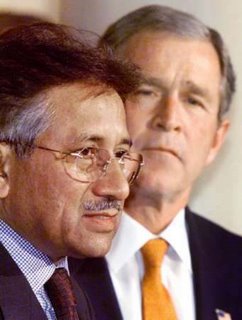Musharraf insists: I'm not George Bush's poodle

"When you are talking about fighting terrorism or extremism, I'm not doing that for the US or Britain. I'm doing it for Pakistan," he said. "It's not a question of being a poodle. I'm nobody's poodle. I have enough strength of my own to lead."
In Britain's case, Blair faced opposition from a remarkably hostile population to his plans to join Bush in invading Iraq.
With these words, General Pervez Musharraf joined Tony Blair as an ally so mistreated by President Bush, that his own population begin to regard it as a matter of national dishonour.
Blair steered a reluctant Labour Party through the contortions of the UN process and succeeded in obtaining a Commons victory only after suffering the largest backbench revolt in British Parliamentary history; only for Donald Rumsfeld to suggest that the US could do it without Britain anyway. Thus triggering a flurry of phone calls to and fro across the Atlantic as Blair demanded Rumsfeld withdraw these remarks as the British population were now even more confused as to why Blair was doing all this if he wasn't even needed.
Now it is the turn of Musharraf to get the Bush ally treatment. His circumstances are even more torturous than Blair's were. He has suffered terribly for supporting the war in terror. Since shortly after 9-11 there were rioting protesters roaming his streets demanding that Pakistan not be used as a base for the intended attack on Afghanistan.
As we all know Colin Powell had left Musharraf with no choice other than to comply. His compliance made him so unpopular in Pakistan that he suffered from two assassination attempts.
One would imagine that with the situation so fragile that Bush would recognise his ally's troubles and tread gingerly, especially as Pakistan is a nuclear power and the removal of Musharraf from office could allow these weapons to fall into the hands of al Qaeda.
Did Bush tread carefully? Not a bit of it. Earlier this year he launched a drone missile attack on the Bajaur tribal area, in an attempt to kill al Qaeda's number two, Ayman al-Zawahiri, which resulted in eighteen deaths and set off a wave of protests across Pakistan. Al Qaeda's number two was not present when the attack took place.
As is usual for this Republican administration, their first course of action was to deny any involvement and then be forced to come clean once the evidence mounts.
To the people of Pakistan this was a national outrage.Another member of the alliance, Liaqat Baloch, told protesters in Lahore that Gen Musharraf should stand down. "It is a threat to our sovereignty and shame for Musharraf's government that it failed to protect the country and the lives of its people," he said.
To add to Musharraf's problems, Bush recently offered nuclear technology to India, Pakistan's greatest rival, and thanked Musharraf for his involvement in the War on terror with a speech emphasising how much democracy was needed in Pakistan.
So now Musharraf finds himself having to condemn the US's actions:
"The strike was an infringement of our sovereignty and I condemned it," said Gen Musharraf.Whilst simultaneously doing exactly what Washington demands:
Mr Bush said he had come to Islamabad "to determine whether or not the president is as committed as he has been in the past to bringing these terrorists to justice".This is the reality of the Bush "coalition". It's about what he wants, on his terms, and don't expect to be thanked for it. Even if you've almost been assassinated twice whilst carrying out his instructions.
He's damaged Blair, he's damaged Musharraf. Berlusconi and Aznar are no longer in office.
To any politician the man is poison. And yet he insists that, if you are not with him, then you must be with the terrorists.
I've always been suspicious of Bush's claim not "to do politics". But when you look at the political carnage he leaves in his wake, it's probably better to take him at his word.
Click title for Guardian exclusive interview.
Tags:






No comments:
Post a Comment